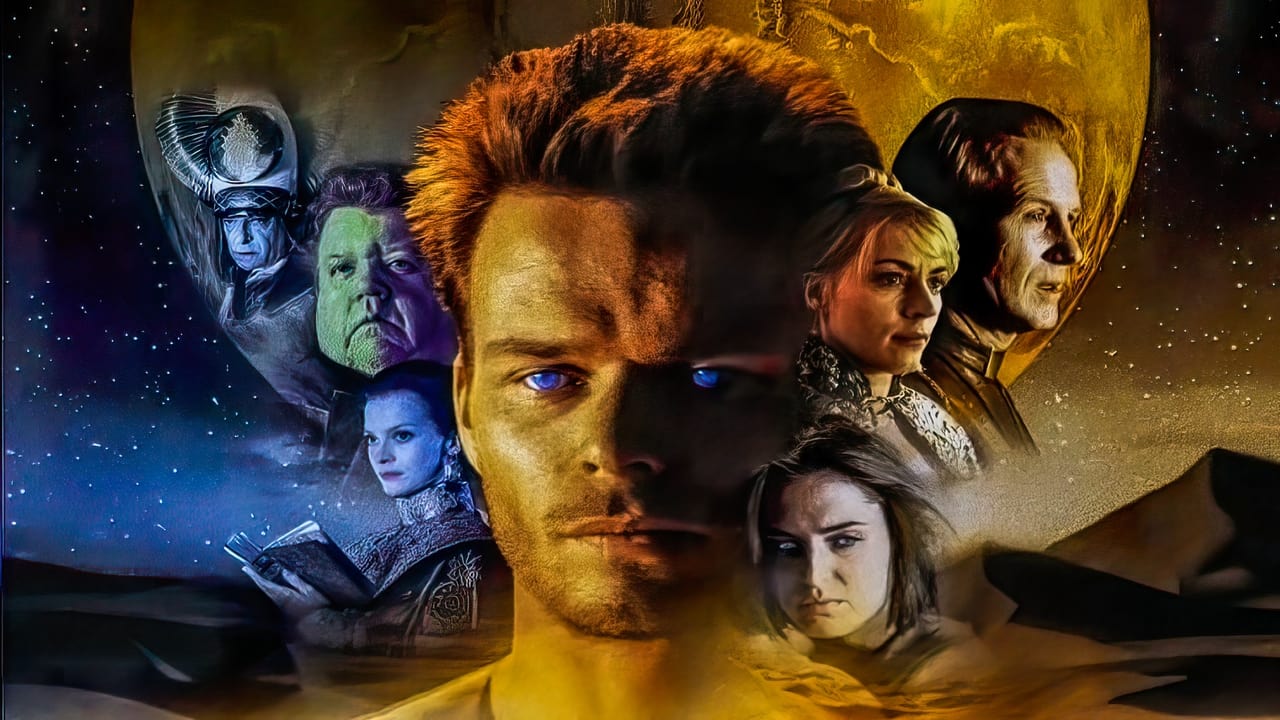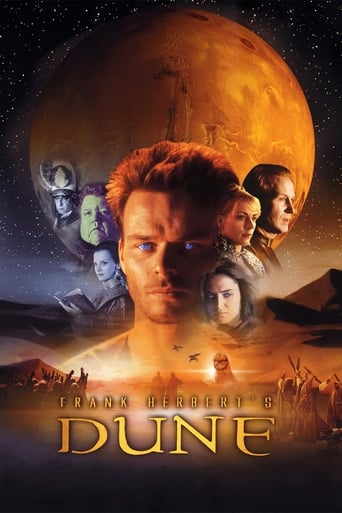WasAnnon
Slow pace in the most part of the movie.
Tedfoldol
everything you have heard about this movie is true.
Rio Hayward
All of these films share one commonality, that being a kind of emotional center that humanizes a cast of monsters.
Sabah Hensley
This is a dark and sometimes deeply uncomfortable drama
bmemoret
Unbearable to watch if you've read the book and vastly inferior to the classic David Lynch movie.
I won't describe how this adaptation betrays the book time after time, not so much in terms of the action, but in terms of the characters -- hardly any is recognizable. After all, many may watch the series who have not read the book.
I will say a few things about the differences between David Lynch's flawed masterpiece (1984) and this adaptation: the acting, the cinematography, and the technology.
The actors are all vastly inferior to those in the 1984 movie, even Paul Atreides, who was the main failure in David Lynch' movie. Baron Harkonnen is supposed to be gross (he is certainly is in both versions), but also smart and sinister -- the 2000 version is just gross. His nephew Feyd Rautha is supposed to be handsome, courtly, but deeply twisted, though lacking his uncle's brains and craftiness; Sting was a perfect Feyd Rautha in the Lynch movie; this one is just giong through the moves, but leaves no lasting impression. Jessica is both a mother, an accomplished politician and administrator, and a viciously effective warrior, but here she has all the charm and presence of a pouting teenager, whereas she was just about perfect in the Lynch movie. The list goes on and on -- the imperial ecologist was a stunning, if somewhat ephemeral presence in the Lynch version, but is another forgettable character here.
The Lynch version suffered at the hands of the producer, but Lynch is one of the great directors and the cinematography is stunning. The three planets (Harkonnen, Atreides, and Dune) are magnificently rendered and the sandworms on Dune have to be seen to be believed, this in spite of much more primitive movie technology in 1984. (This is another of my complaints: the special effects and background scenery in this 2000 version are laughably bad -- no realism, but no poetry and inspiration either; they do not convey any sense of space, harshness or fertility, menace or pollution; they just look like 1950ss B-movie painted backdrops.) This 2000 version has no imagination and no artistry; it provides more details (e.g., the face masks are lovingly detailed) , but they add nothing -- just like the much longer running time of the three episodes (compared to the relatively short Lynch movie) covers much more ground, but does not tell the story nearly as well.
I'll take the flawed gem over the plodding, unimaginative, literal new version any time, for better storytelling, for infinitely better casting and scenery, and for overall artistry.
WakenPayne
After reading the Frank Herbert novel I watched both versions you can get of the David Lynch movie and the Theatrical cut was horrible, the extended cut was a guilty pleasure of mine. So I also decided to watch the Dune mini series as well because I think that 4½ hours could have actually told the story better then the Lynch movie and suffice to say, it did but there are still some problems.The plot is that Duke Leto Atreides and his son Paul are on a desert planet called Arrakis to sort out the production of a spice which is also the most valuable resource in the universe. But it's a plot by the Emperor of the known universe to have the rivals to the Atreides, the Harkonnens to attack and kill them because the Emperor felt Leto was getting more popular then him. This causes Paul and his mother to go on the run into the Desert where the natives of Arrakis are in order to rise up against the unfair rule the Harkonnens are enforcing.While this does tell the story better then the David Lynch movie there are still some things that aren't explained. It isn't enough to throw you off guard for the entire movie like Lynch's movie but there are still some things that aren't explained. I would say that and some of the acting and special effects get hokey at times, some of the costume design is just ridiculous to the point of never being able to take them seriously for the entire time they're wearing it.Aside from that this is better then the David Lynch movie in almost every regard. While there are still some problems with the narrative at least enough was told so there is some semblance of character development in there and while I did say the acting was hokey at times for the most part it holds up and in some cases the choices here were better then the ones in the David Lynch movie.All in all while it isn't a perfect adaptation this is actually worthwhile. This has some problems, I'll admit that but it's probably the best adaptation of the original Dune novel out there.
simondclinch-1
The pace through the plot is about right in this mini-series (the 1984 film was in too much of a hurry). There is reasonable adherence to the book - it would take double the time to follow everything in the book. The shortcuts are reasonable (e.g. dropping Paul's second Fremen name "Usul"). Score is good, with a memorable and pretty theme tune; although personally I would have put more into the rhythm in a few places for contrast (it's more ambient than necessary throughout IMO).One or two gripes: the spice-affected eyeballs look like they have back- lighting wired in - there was no need to deviate from the book's simple deep blue iris and light blue sclera, i.e. without going bionic on the lighting.Accents of actors are sometimes good, sometimes inconsistent. For example, if Shaddam has an Italian accent, then some of it should rub off on his children. And the Fremen accent is all over the place - sometimes Egyptian, sometimes east European. And given that the Fremen language is clearly a descendant of Arabic, then "Shadout Mapes" shouldn't rhyme with "grapes" - I'd choose either "mar-pess" or "mar- pesh" - in fact the latter would sound the more convincing to me in the context of the story.As other reviewers have hinted at, but not covered specifically, the director fails to represent the idea of prescience nor the role of the mentat properly. Instead of presenting these as visions and calculations (respectively) of the possible future, as described in the book, we see almost randomly juxtaposed images, much more suggestive of the 70's hallucinogenic culture than the book intended, in spite of its 70's publication date.Nevertheless, in comparison with what the genre usually offers, I still give it ten out of ten.
Mikael Kuoppala
Frank Herbert's "Dune" series is one of the most respected science fiction epochs of all time. The saga begged to be adapted into a drama and in 1984 master director gave us a 2 hour feature of the first book. The project was plagued by creative restrictions, leaving both Lynch and audiences disappointed with the final product.In 2000 Sci-Fi Channel adapted the same opening book into a five hour miniseries. The project was helmed by director John Harrison backed by a big-for-TV budget. The result is a visually extravagant and experimental drama with a grandiose scope. I watched it all in one sitting and was completely engaged throughout the experience.Harrison has reached a unique and beautiful tone with a magnificent visual look and dramatic music and the actors do for the most part solid work. Alec Newman doesn't quite have the charisma of a messianic character, but the script doesn't give him as much to work with as one might have hoped.The characters overall are left a bit distant, the situations coldly surreal. I found myself preoccupied by the look and the tone and not horribly engaged with the story and the drama itself. The plot moves forward painfully slowly at times, but there are so many wonderful details to enjoy that it's almost worth it. And as is the case with the source material, the religious and political themes are universally relevant and well presented, even though we experience them on a rather large scale, removed from the experience of the characters.

